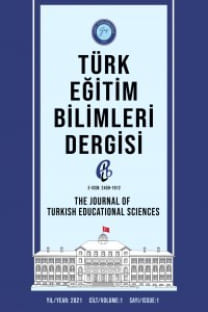Lise Kimya Öğretiminde Laboratuvar Kullanımına İlişkin Öğrenci Görüşleri
Student Views on the Loboratory use in High School Chemistry Education
___
- Apaydın, A.; Kutsal, A.; Atakan C. (1997).Uygulamalı İstatistik. Kültür Kitapevi Ankara,
- Ashman, A. (1985), Chemistry in schools-past, present and future. Part 1. School Science-Review, 66:237, 696- 704
- Aydoğdu, C. (1991). Kimya Öğretiminde Laboratuvarın Önemi, Laboratuvarın Teknikleri ve Uygulamaları. Hacettepe Üniversitesi Fen Bilimleri Enstitüsü, Ankara
- Aydoğdu, C. (1999) Hacettepe Üniversitesi Eğitim Fakültesi Dergisi. Ankara, 15, 30
- Beach, D. H.; Stone, H. M. (1988). Survival of the High School Chemistry Lab. Journal of Chemical Education, 65:7, 619-620
- Beasley, W. (1985). Improving Students laboratory Performance: How much Practice Makes Perfect ? Science Education, 69, 567-576.
- Ben Zwi, R.; Hofstein, A.; Samuel, D.B.; Kempa, R. (1976) . The attitude of high school students to the use of filmed experiments in laboratory instruction. Journal of Chemical Education, 53, 575-577
- Bekar, S. (1996). Laboratuvar Destekli Fen Bilgisi Öğretiminin Öğrenci Başarısına Etkisi. Yüksek Lisans Tezi, Gazi Üniversitesi Fen Bilimleri Enstitüsü Ankara
- Demirci, B. (1993). Çağdaş Fen Bilimleri Eğitimi ve Eğitimcileri. Hacettepe Üniversitesi Eğitim Fakültesi Dergisi. 9. 155-157
- Gürdal, A. (1991). İlkokul Fen Eğitiminde Laboratuvar ve Araç Kullanımı. M. Ü. Eğitim Fakültesi Dergisi., 3, 145-155, İstanbul
- Hilosky, A.; Sutman, F.; Schmuckler, J. (1998). Is Laboratory-Based Instruction in Beginning College-level Chemistry Worth the Effort and Expence. Journal of Chemical Education, 75:1, 100-104.
- Kozma, R. (1982). Instrumental design in a chemistry laboratory course: the impact of structure and aptitudes on performance and attitudes. Journal of Research in Science , 19, 261-270.
- Lagowski, J.J (1989). Reformatting the Laboratory. Journal of Chemical Education, 66:1, 12-14.
- Newman, M.S. (1982). A Beginning Undergraduate Organic Laboratory Course for the Serious Student. Journal of Chemical Education, 99:4,387-388.
- Odubunni, O.; Balagun, T.A. (1991). The Effect of Laboratory and Lecture Teaching Methods on Cognitive Achievement in Integrated Science. Journal of Research in Science Teaching, 28, 213-224
- Özdamar, K. (1999). Paket Programlar İle İstatistiksel Veri Analizi. Kaan Kitabevi, Eskişehir.
- Shakhashiri, B.Z. (1984). Lecture Demonstrations. Journal of Chemical Education, 61:11, 1010-1011
- Stensvold, M. S.; Wilson, J.T. (1990). The Interaction of Verbal Ability with Concept Mapping in Learning From a Chemistry Laboratory Activity. Science Education 4:4, 473-480
- Tanis, D.O. (1984). Why I Do Demonstrations. Journal of Chemical Education, 61:11, 1010-1011.
- Başlangıç: 2003
- Yayıncı: ANKARA HACI BAYRAM VELİ ÜNİVERSİTESİ
İLKÖĞRETİM OKULLARINDAKİ "MESLEK ÇALIŞMA" UYGULAMALARININ ETKİLİLİĞİ İLE İLGİLİ GÖRÜŞLER
"GELİŞİMCİLİK" ÖĞRETİSİNİN EĞİTİM VE ÖĞRETİM ETKİNLİKLERİNE ETKİLERİ ÜZERİNDE DÜŞÜNCELER
LİSE KİMYA ÖĞRETİMİNDE LABORATUVAR KULLANIMINA İLİŞKİN ÖĞRENCİ GÖRÜŞLERİ
EDEBİYAT VE KOMPOZİSYON EĞİTİMİNDE KARŞILAŞILAN SORUNLAR (ALAN ARAŞTIRMASI-VAN ÖRNEĞİ)
Mustafa AYYILDIZ, Ümit BOZKURT
Okul Deneyimi I Dersinden Öğrencilerin Beklentileri ve Bu Beklentilerin Karşılanma Düzeyi
"Gelişimcilik" Öğretisinin Eğitim ve Öğretim Etkinliklerine Etkileri Üzerine Düşünceler
SOSYAL BİLGİLER DERSİNE YÖNELİK TUTUMUN BAŞARIYA ETKİSİ
OKUL DENEYİMİ I DERSİNDEN ÖĞRENCİLERİN BEKLENTİLERİ VE BU BEKLENTİLERİN KARŞILANMA DÜZEYİ
AMERİKAN GÖNÜLLÜ KURULUŞLARI: BARIŞ GÖNÜLLÜLERİNİN DÜNYADA VE TÜRKİYE'DEKİ ÇALIŞMALARI
"GELİŞİMCİLİK" ÖĞRETİSİNİN EĞİTİM VE ÖĞRETİM ETKİNLİKLERİNE ETKİLERİ ÜZERİNDE DÜŞÜNCELER
